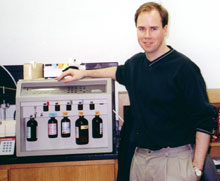Chris Wilds comes home for a Canada Research Chair

Chris Wilds with an automated synthesizer.
If you ask him, chemist Christopher Wilds won’t contradict faint comparisons to culinary master Julia Child.
“What we do is something called organic synthesis,” the native Montrealer said of his research. “It’s kind of like cooking. We put things in a flask, add different reagents and hopefully end up with what we want.”
But Wilds, a new assistant professor in the Department of Chemistry and Biochemistry, and a Concordia alumnus, isn’t labouring to create the perfect soufflé. Instead, this talented scientist is striving to develop a recipe for a cancer-fighting weapon.
Currently, some forms of chemotherapy combat the spread of cancer by putting a “lock” on DNA, preventing the cancerous cells from multiplying. But when patients develop a resistance to the therapy, the lock is broken, causing cells to once again multiply and the disease to spread.
Wilds hopes to eventually find a way to use chemically synthesized DNA to help understand how cancer cells repair this damage. Understanding DNA’s interactions with the cellular machinery involved in these repairs could be useful in developing more effective chemotherapeutic agents in the future.
Wilds’ interest in nucleic acid chemistry dates back to a research project he did during his undergraduate studies at Concordia. In addition, research he published while a member of the Institute for Co-operative Education at Concordia was instrumental in helping him obtain scholarships during his PhD, and land prestigious postdoctoral fellowships at Northwestern University, Vanderbilt University and Johns Hopkins University.
After several years in the United States, his desire to be closer to family, coupled with the lure of a unique opportunity at Concordia, brought him back to Montreal.
The opportunity was to take part in the Canada Research Chairs program. Wilds is one of seven newly minted Canada Research Chairs at Concordia this year.
The program, initiated in 2000 by the Canadian government, has established 2,000 research professorships in universities across the country. The chair-holders do a combination of teaching and research, advancing the frontiers of knowledge in their fields.
Wilds called the program “solid gold,” and commends it as a powerful recruiting tool for universities. “I can’t say enough good things about it. It’s helping Canadian universities get a competitive edge.
“This [program] is Canada’s way of helping to keep existing talent here, as well as bringing talent in from other countries. Or in my case, helping bring a Canadian back home.”
Thus far, Wilds has been impressed with Concordia’s commitment to scientific research.
“With the new Richard J. Renaud Science Complex, and the addition of several tenure-track researchers in the past few years, clearly Concordia is serious about making the effort to promote and support research,” he said.
Wilds has experience in both industrial and academic environments and believes he will make a great impact in academia. “Drug companies are out there to make a profit. At the end of the day, they have to get something on the market; they have to generate revenue.
“[In academia], we’re allowed to take more risks. We don’t have to worry about angry stockholders. We might come across big breakthroughs, but this is fundamental science.
“There’s a real human component to what we do. The research is important, but we’re also instrumental in training people. We’re the source for where scientists, doctors and engineers come from.”
To say Wilds is enthusiastic about his position at Concordia would be an understatement.
“I’m so lucky to do what I love. It doesn’t get much better than this.”